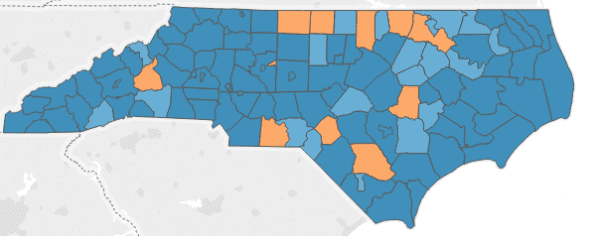Annual measurable targets by district, 2013-2014

This week’s map looks at the school districts that met annual measurable objectives (AMOs) across the state.
AMOs are a series of performance targets that state, school districts and schools must meet on designated assessments and indicators for specific subgroups of students annually to meet the requirements of the Elementary and Secondary Education Act (ESEA) waiver and No Child Left Behind (NCLB) legislation. Beginning in 2013-14, North Carolina moved away from reporting Adequate Yearly Progress (AYP) under NCLB for schools and moved toward reporting AMOs with the expectation that more ambitious performance targets be set.
Choose from the menus below the map to see the rates for a specific measure and student subgroup. Districts in dark blue met the AMO target, while those in orange did not meet the target. Districts lacking a reported percent or having too few students of a demographic group are not displayed.
Districts in light blue met the target using an alternative calculation that acknowledges a margin of uncertainty associated with any group statistic to determine if target goals for AMOs were met. Note, while these districts met the target, the actual percent of students listed is below the target assigned.
A few observations about the numbers:
- Eight districts met all the target goals in 2013-14.
- Only 4 targets were met at the state level: graduation rate, science performance for grades 5-8, math rigor, and ACT participation.
- The majority of districts met their targets for graduation rate (90 percent), math rigor (86 percent) ACT participation (82 percent).
- Districts in the mountain region and near the coast were more likely to meet targets for science performance for fifth- and eighth-graders.
- Only 24 percent of districts met the reading performance targets for grades 3-8. Most of these that did are in the mountains or on the coast, with a few in the major metro areas of the Piedmont.
The UNC Charlotte Urban Institute provides weekly maps and data dashboards to highlight relevant statewide education statistics for EducationNC, a nonpartisan, nonprofit news source aiming to create a bipartisan, statewide conversation about public schools. Learn more about this initiative here.
Staff